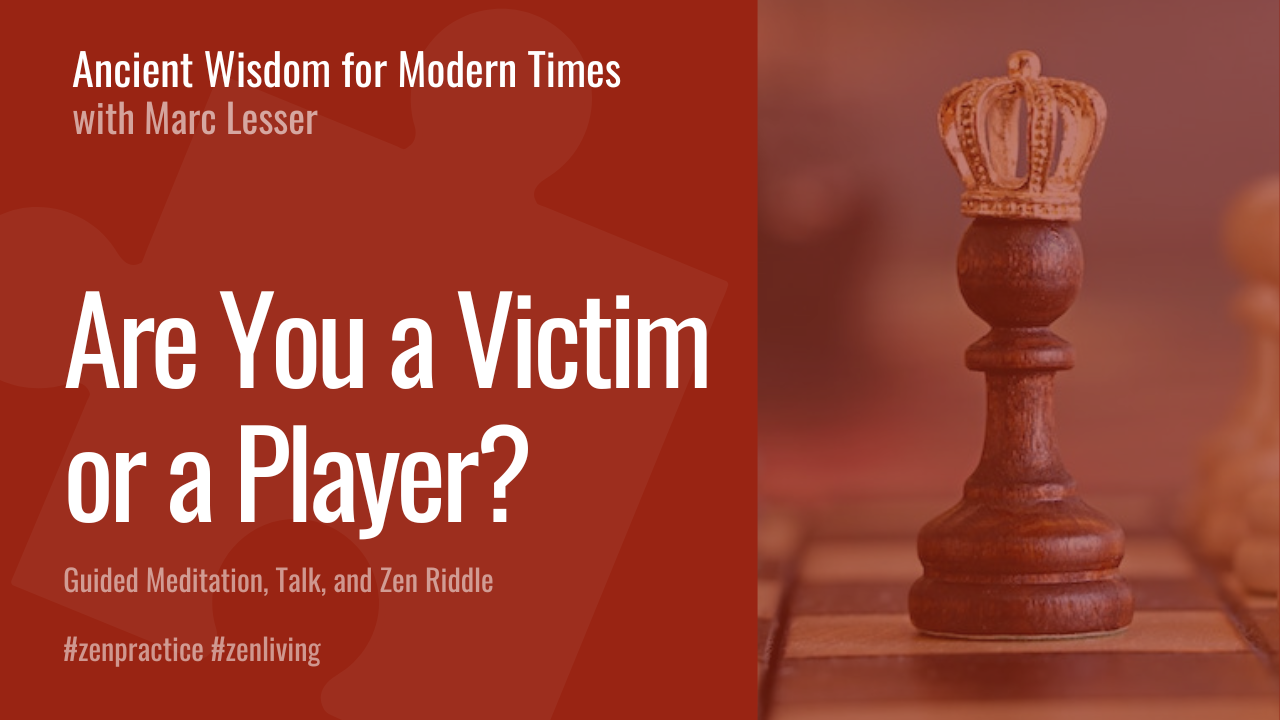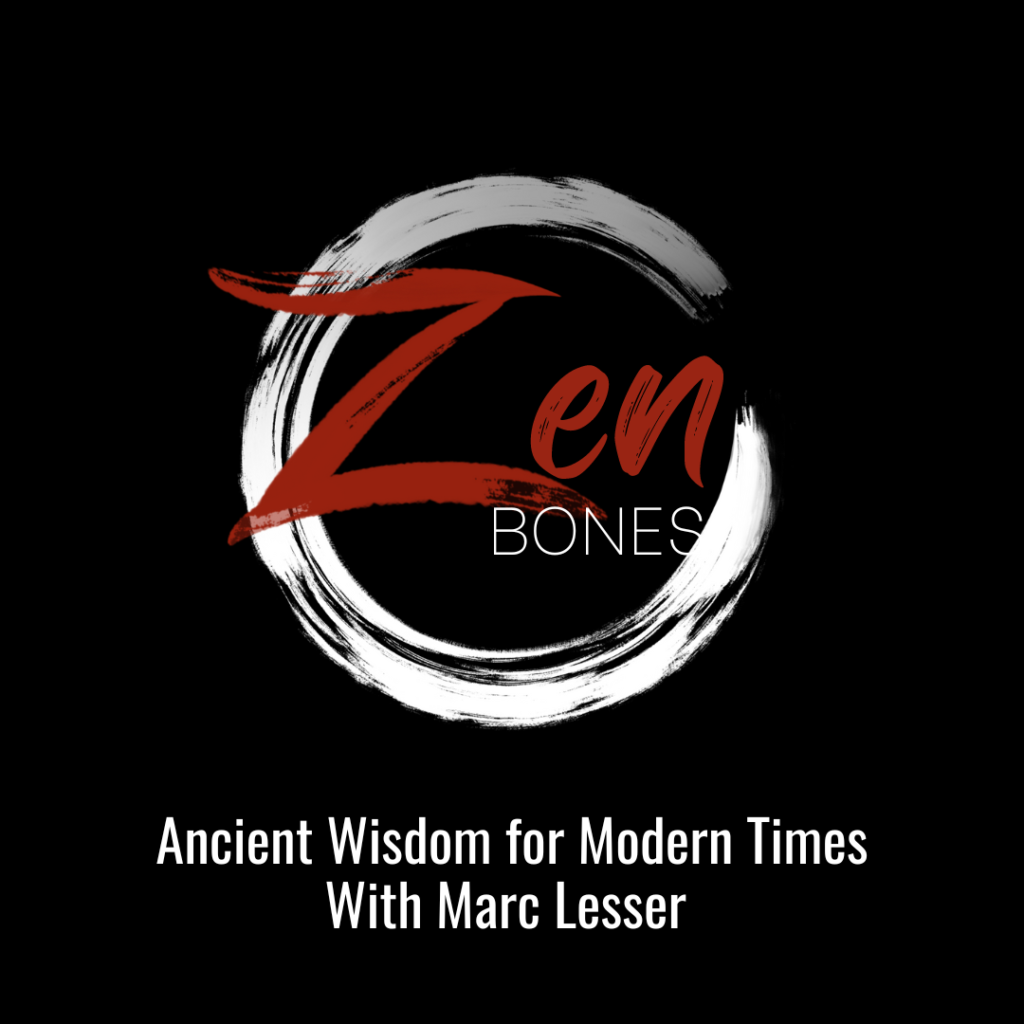In today’s episode Marc leads a short guided meditation with an emphasis on cultivating warmhearted curiosity. He then gives a short talk on shifting your approach from being a victim to being a player, or as Shunryu Suzuki says, being “the boss of everything.” This is the practice of taking radical responsibility for your feelings, thoughts, and actions.
Today’s Zen puzzler is a simple yet profound expression: Whatever You Meet is The Path.
EPISODE TRANSCRIPT
[music]
Marc Lesser: Welcome to Zen Bones, Ancient Wisdom for Modern Times. This is Marc Lesser. Why Zen Bones? Our world is in crisis and ever-shifting, and now more than ever, more wisdom, clarity, and courage are essential, especially in the world of work, business, and leadership.
[music]
Marc Lesser: In today’s episode, we begin with a short guided meditation with an emphasis on cultivating warm-hearted curiosity. I then give a short talk on shifting your approach from being a victim to being more of a player, or as Shunryu Suzuki says, to being a boss of everything. It’s a way of taking radical responsibility for your feelings, your thoughts, and your actions. Today’s Zen puzzler is a simple yet profound expression, “Whatever you meet is the path. Whatever you meet is the path.” I hope you enjoy today’s episode.
[music]
Marc Lesser: Let’s do some sitting practice together.
[bell ringing]
Marc Lesser: It feels like such a privilege and an opportunity to pause, a sacred, sacred pause entering as much as possible this space where we don’t need to measure, judge, or accomplish anything. Letting go of all of that and just being here with the body, bringing awareness to the body, bringing awareness to the breath, letting thinking mind do its thing. Our minds will generate thoughts but we can train ourselves to not be caught or follow them and to gently and firmly come back, come back to the breath, back to the body with as much curiosity. I like to think of it as warm-hearted curiosity as we can cultivate or bring forth.
There’s no need to try and change anything. Whatever you are bringing in terms of your feelings, your mood, attitude. We’re dropping it as much as possible, but at the same time, being aware, being aware of what is. This is a simple profound practice of pausing. Keeping it simple. Breathing in and breathing out. A Zen teacher, Shunryu Suzuki says, “Our breath is just like a swinging door.” I appreciate that model.
Simply being breathed and noticing how, as we follow the breath, settling, opening, being curious about our experience. What is it like right now to be here, breathing, alive? No need to wait. No need to wait for some better time, better thoughts. Right now, right now bringing our full awareness and experience to this moment, this breath. Everyday mind or ordinary mind is a famous Zen dialogue. What is the way? What is the way to waking up? An ordinary mind is the way. An everyday mind is the way.
[pause 00:06:19]
Marc Lesser: Seeing if it’s possible to approach our experience with curiosity and warmheartedness. Please feel free to continue with this sitting practice. I’m going to ring a bell. Whatever works for you, to continue or not.
[bell ringing]
[music]
Marc Lesser: I want to talk about a way to work with our underlying attitude. I’ve noticed there’s many, many models, many ways to talk about this, but for now, I want to start with the question, are you a victim or are you a player? Are you a victim? Are you not responsible for how you respond or are you more engaged? In Zen Mind, Beginner’s Mind, there’s a part of a chapter called You Are the Boss of Everything. This is, I think, a particular way of saying encouragement to be responsible, to be a player, to see quite viscerally how we create our worlds. This is the approach and understanding and way of being of a player, a very different than the blame game.
I was thinking, though, of– it was just the other day that I was making some apple juice using a very old juicer and afterwards I was trying to assemble it, and I couldn’t quite figure it out. Whatever I did was not quite working. I noticed I was getting more and more frustrated, and my inner Homer Simpson began to shine. I could hear myself complaining, why must everything be so hard? One of Homer Simpson’s famous lines. I think of it now these days as my inner Homer Simpson. Why must everything be so hard?
This is, I think, the mind of a victim. I found by labeling it this way and by making some lightheartedness about it and noticing that I could see that what I think more of my inner player began to emerge, that I noticed some tightness and that I was able to shift from tightness by adding just a little bit of humor. As I was putting this juicer back together, I began trying things. I began to be more curious, and I had a series of small ahas, of small insights and how the machine works, what was I doing wrong? How does it fit? Little by little, voila, I got it back together.
It’s interesting, I think there’s actually some science that says that when we get tight, it literally makes us dumber. It literally gives us less options, makes us less creative. This I think is the beauty, the possibility, the importance of the shift from being a victim, being tight, blaming to opening, being much more– becoming the boss of everything. This victim mentality is the sense of being powerless to solve things, being powerless to affect change, feeling as though we lack influence with other people, with circumstances, with systems.
When this happens regularly, what I’ve noticed, it can lead to a state of cynicism. In the work that I do, with CEOs and with leaders, I’ve noticed that cynicism often can be the default mode in how we are at work and in organizations. I think this is true in many of our important relationships. A lesson that I’ve learned is that if we are not actively cultivating trust and understanding, then without realizing it, we may be actively cultivating a cynical attitude. Again, I think there’s a great deal of similarity between the mindset of the cynic and the mindset of the victim.
The antidote to feeling powerless and to seeing yourself as a victim is to own and act, cultivate the perspective of a player. A player is someone who recognizes difficulties, challenges, and failures, and seeing everything may be hard as our friend Homer Simpson says, but it doesn’t mean that it is stuck or immovable or permanent. A key insight of a player is that there are events and there is how we interpret and respond to these events.
This, I think, is so simple and obvious. Of course, we are influenced by events, and it would be not accurate to say that events don’t matter, but our state of mind and our approach matters and often matters even more. There are events and there is how we interpret and respond to events. A player lives, breathes, and acts from this distinction. A player is someone who sees every situation as an opportunity to learn.
Feeling like a victim is a way that we get stuck. We narrow ourselves, we’re cut off from our vision of what’s possible, our vision of successes, of possibilities for ourselves and from those around us. A player is someone who sees and faces difficulties and challenges, and is looking for and working toward solutions. For small wins, as well as for larger, for systemic change.
A player notices when they themselves or others have slipped into this victim mentality and uses this opportunity as a time to shift your approach, a way to become and cultivate an attitude that is more positive, more optimistic right in the midst of a situation that might feel impossibly difficult or entrenched. How do we embody this? How do we practice this? I think the key practice is to notice the mindset of a victim and notice the mindset of a player. Just noticing. That language in that model can be helpful.
Noticing especially when we are tight or judging or frustrated to explore, trying on different stories, different perspectives. Bringing some humor in, try laughing at yourself. In one of Shunryu Suzuki’s teachings, he says that laughing at ourselves is perhaps a kind of enlightenment. The other practice is to play with, “What does it feel like? What does it feel like in the body to be in the mode of a player? What supports you for this? What support do you need to feel like a player in this attitude?”
Again, this attitude of, “What can you learn from every situation? How can you play more with cultivating the mindset of a player, or cultivating the mindset where there is becoming a student of frustration, becoming a student of cynicism, but most of all becoming a student of waking up, bringing awareness to your own approach, your awareness to your own attitude.” I think one of my, again, favorite expressions or quotes from Zen teacher Shunryu Suzuki is that he says, “The purpose of our lives is to shift from being tight, from being closed to becoming more awake.”
I think you could almost say the purpose of our lives, the purpose of our lives at work and in all parts of our worlds is this shift from being reactive, from being a victim to becoming the boss of everything, to becoming a player.
[music]
Marc Lesser: Welcome to the Zen Bones puzzler, where I will regularly be presenting a story or a Zen koan or a poem, something to contemplate, to think about, a story that has purpose. It’s about developing greater insight and reflection, not so much for a solution, but as a way to support your practice, a meditation in daily life.
[music]
Marc Lesser: Today’s Zen puzzler comes actually from a Tibetan Buddhist tradition called lojong teachings. These are teachings that use various slogans or lists as a way of contemplating those or integrating some slogans into our daily lives as a way to become more aware, more clear about our motivations. In some way, these are practices for shifting from being a victim to becoming a player.
The slogan for today, very simple, the slogan is, “Whatever you meet is the path. Whatever you meet is the path.” Again, in Soto Zen practice, I’m presenting this as a puzzler or a Zen koan. Clearly, it’s not like this has any solution, it’s meant to deepen us, to inform us, to shift us. Imagine anytime you are feeling your inner Homer Simpson, anytime you’re feeling a challenge, you come back to this expression, “Whatever you meet is the path. Our challenges are the path. Our grumpiness is the path. Our love, our passions, our desires, things that push us away, whatever it is we’re feeling, it’s all the path. Whatever you meet is the path.”
One very practical way to work with this is to do some journal writing about it. What does this mean? Whatever you meet is the path, or to write it down on a card and keep it somewhere on your desk or maybe on the dashboard of your car. Driving can be a great– imagine seeing driving, whether you’re in traffic or being cut off by another driver, “Whatever you meet is the path.” I hope you will enjoy and practice and learn from today’s Zen puzzler, “Whatever you meet is the path.” Thank you.
[music]
Marc Lesser: Listen in each week for interviews, teachings, and guided meditations, you’ll receive supportive tools for creating more meaningful work and mindfulness practices to develop yourself, to influence your organization, and to help change the world. Thank you for listening.
[music]
[00:20:11] [END OF AUDIO]









